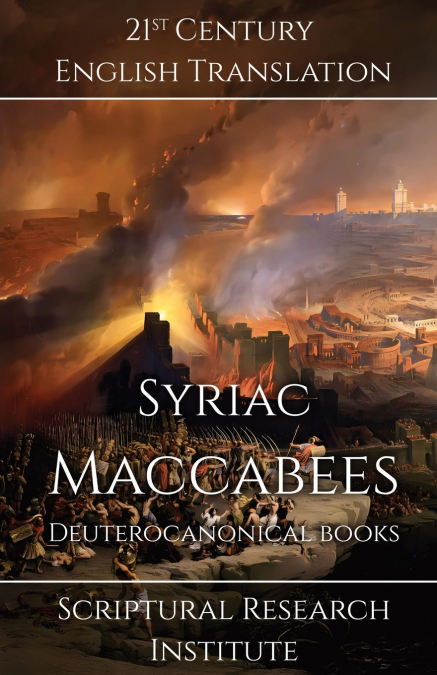
Scriptural Research Institute
The Syrian tradition churches of the Middle East and South Asia, have maintained several deuterocanonical books that are not included in the Peshitta, the standard Syriac version of the Christian Bible. The Peshitta includes Syriac translations of the four books of the Maccabees found in the Septuagint, along with a 5th book of Maccabees, which is also labelled as the The History Of The Destruction Of Jerusalem. This book is a Syriac translation of the 6th book of Josephus’ The Judean War. General Josephus had started on the Judean side of the rebellion, however, was captured by the Romans, and survived the war. During the fall of Jerusalem, he was part of Caesar Titus’ entourage who tried to negotiate with the Judean rebels in Jerusalem. After the destruction of Jerusalem, Josephus was given some of the surviving archives and wrote Antiquities of the Judeans, as well as The Judean War. These books survive in Greek; however, it is generally agreed that Josephus wrote these books in Judeo-Aramaic, and then translated them into Greek, as the audience he was writing to was the Judean diaspora in the Middle East. The Syrian churches have traditionally claimed that the Peshitta’s 5th Maccabees is a Syriac transliteration of Josephus’ original Aramaic text.In addition to the five books of the Maccabees found within the Peshitta, there is additional Syriac literature associated with the woman and her seven sons, who were tortured to death by King Antiochus. In this literature, she is named Shamoni, and her sons are known as the Maccabean martyrs. This concept appears to have developed in the Syriac tradition before the full text of the four Maccabees books in the Septuagint were translated into Syriac in the 5th century AD. The particular Maccabees books in the Septuagint were written in Greek, although they drew on older Aramaic and Judahite literature that is now lost. In the Greek, Hebrew, and Arabic books about the Maccabees, the seven martyrs are never referred to as the Maccabees, this term is used to refer to the followers of Judas, several decades later.The most famous of these Syriac works is the poem Lady Shamoni and the Maccabean Martyrs, which Western biblical scholars have dubbed 6th Maccabees. The poem goes into more detail regarding the torture of the sons of Shamoni than 2nd Maccabees, where the author skipped over most of the gruesome details and then ended the chapter with 'This is enough about the eating of sacrifices and the extreme tortures.' A lesser-known Syriac work is The Story of the Lady and her Seven Sons, which Western biblical scholars have dubbed 7th Maccabees. 7th Maccabees is probably the older of the two, as it does not refer to the seven martyrs as the Maccabees, which is common in Syriac Christian literature. This isn’t clear, as the reference to the seven martyrs as ’the Maccabean Martyrs’ is found in the title of 6th Maccabees, and not the text itself. The title is likely something created by the Christian editor.In 563 AD, a Syrian scholar named John Malalas composed a history of the world subsequently called the Chronographia. The Chronographia was written in Greek, however, John was drawing from both Greek and Syriac sources and created one of the longer historical works of the era. A very small section of his work mentions the beginning of the Maccabean Revolt, which has garnered the attention of academics studying the era. His text is clearly influenced by the Syriac tradition here and ignores the Greek entirely for some reason. This section of the Chronographia has been dubbed 8th Maccabees by scholars studying Maccabean literature.